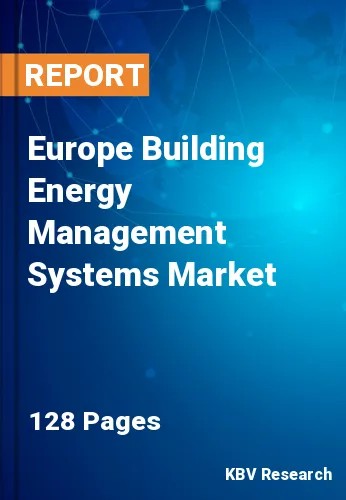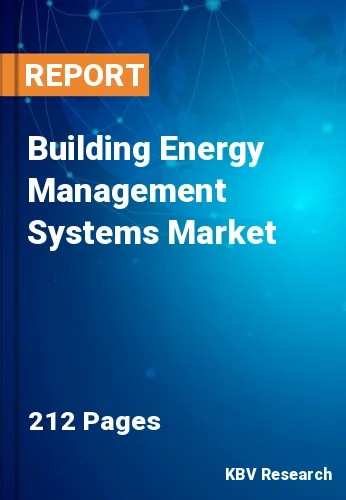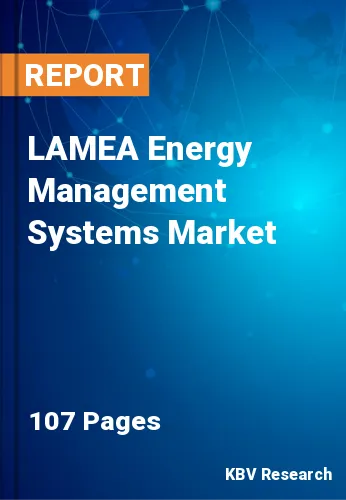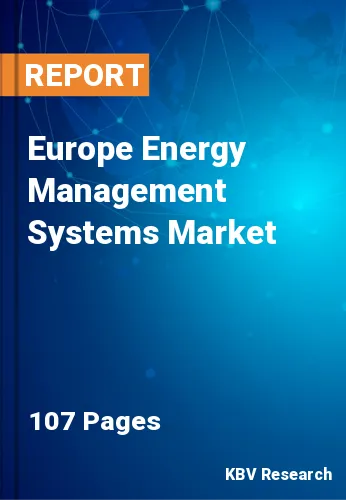The Global Energy Management Systems Market is Predict to reach $107.1 Billion by 2028, at a CAGR of 15.6%
Special Offering :
Industry Insights | Market Trends | Highest number of Tables | 24/7 Analyst Support
Energy Management Systems Market Growth, Trends and Report Highlights
According to a new report, published by KBV research, The Global Energy Management Systems Market size is expected to reach $107.1 billion by 2028, rising at a market growth of 15.6% CAGR during the forecast period.
The Services segment has shown growth rate of 17.7% during (2022 - 2028). Energy management services are defined as a service provided by a public utility that provides electric power, heat, or light for the purposes of energy consumption management, control, information, and communication. Advanced technologies like artificial intelligence, big data analytics, the Internet of Things (IoT), cloud computing, and machine learning are assisting in the modernization of energy systems (ML). Data analytics, as well as remote energy monitoring, are now possible due to these modern technologies. In addition, the existence of a number of smart sensors, devices, and integrated circuits in the EMS network necessitates continuous monitoring, control, and maintenance. The growth of the segment is increasing due to these factors
The Industrial segment is leading the Global Energy Management Systems Market by Type in 2021; thereby, achieving a market value of $58.1 billion by 2028. The rising growth of the segment is owing to the fact that EMS has significant growth prospects in the industrial sector, particularly in the power and manufacturing industries, for monitoring real-time power consumption patterns and lowering costs. Due to the rising implementation of automation technologies across industrial processes, industrial energy management will hold a considerable energy management system market share among them. Smart infrastructure development, in combination with government backing, generates significant investments in residential and commercial projects including smart hospitals, smart buildings, and smart homes. These infrastructures are driving up demand for energy-efficient systems. Therefore, the growth of the segment is being augmented by these factors.
The Residential segment is showcasing a CAGR of 17.2% during (2022 - 2028). Due to rising awareness about the advantages of efficient energy management solutions in regular use, the residential segment is estimated to flourish throughout the forecast period. The rising power generation costs and a growing need for effective energy management and conservation in residential structures, smart homes, and societies are likely to drive up the demand for EMS across the residential sector.
The Energy & Utilities segment acquired maximum revenue share in the Global Energy Management Systems Market by End User in 2021, thereby, achieving a market value of $33.8 billion by 2028. The increasing growth of this segment is attributed to the rising demand for energy consumption monitoring in numerous sub-sectors, such as power generating, oil & gas, chemical, and petrochemical complexes. Moreover, it has also resulted in the commercialization of EMS modules across the board. Carbon dioxide, nitrogen, and Sulphur oxide emissions are all key sources of pollution in the energy and utility industries. The deployment of energy management systems across the energy and utility industries is being driven by the need to control emissions and manage quotas & credits. Moreover, smart building and smart city projects are deploying intelligent technology in large numbers to reduce the vast consumption of energy resources in urban areas.
North America is the fastest growing region in the Global Energy Management Systems Market by Region in 2021, and would continue to be a dominant market till 2028; thereby, achieving a market value of $36.3 billion by 2028. The Europe market is estimated to witness a CAGR of 15.1% during (2022 - 2028). Additionally, The Asia Pacific market would display a CAGR of 16.4% during (2022 - 2028).
Full Report: https://www.kbvresearch.com/energy-management-systems-market/
The market research report has exhaustive quantitative insights providing a clear picture of the market potential in various segments across the globe with country wise analysis in each discussed region. The key impacting factors of the market have been discussed in the report with the elaborated company profiles of General Electric (GE) Co., Siemens AG, Yokogawa Electric Corporation, Honeywell International, Inc., Schneider Electric SE, DEXMA Sensors, SL, Delta Electronics, Inc., Johnson Controls International PLC, C3.ai, Inc., and GridPoint, Inc.
Global Energy Management Systems Market Segmentation
By Component
- Solution
- Services
By Type
- Industrial
- Building
- Home
By Application
- Commercial
- Residential
By End User
- Energy & Utilities
- IT & Telecom
- Manufacturing
- Retail
- Healthcare & Life Sciences
- Others
By Geography
- North America
- US
- Canada
- Mexico
- Rest of North America
- Europe
- Germany
- UK
- France
- Russia
- Spain
- Italy
- Rest of Europe
- Asia Pacific
- China
- Japan
- India
- South Korea
- Singapore
- Malaysia
- Rest of Asia Pacific
- LAMEA
- Brazil
- Argentina
- UAE
- Saudi Arabia
- South Africa
- Nigeria
- Rest of LAMEA
Companies Profiled
- General Electric (GE) Co.
- Siemens AG
- Yokogawa Electric Corporation
- Honeywell International, Inc.
- Schneider Electric SE
- DEXMA Sensors, SL
- Delta Electronics, Inc.
- Johnson Controls International PLC
- C3.ai, Inc.
- GridPoint, Inc.
Related Reports:







